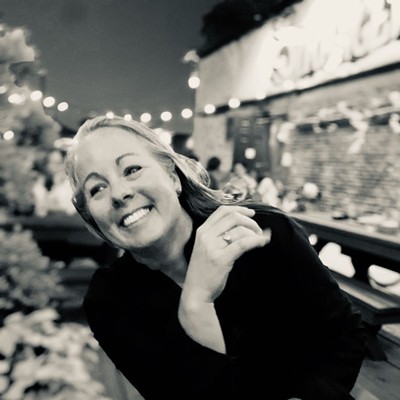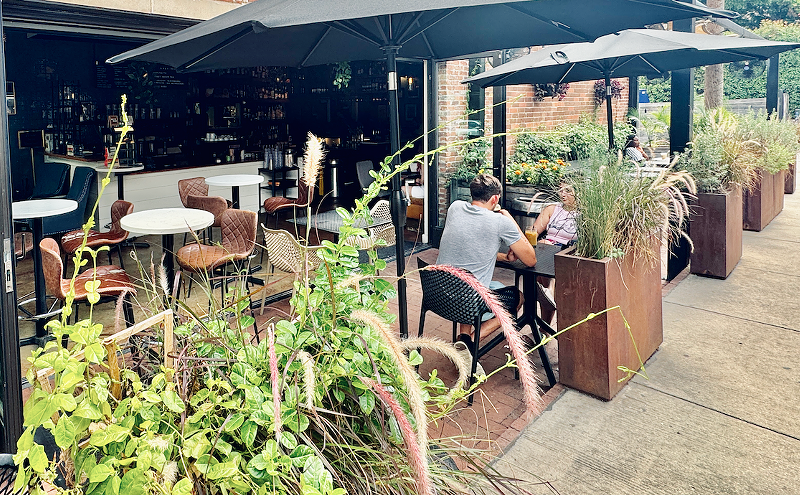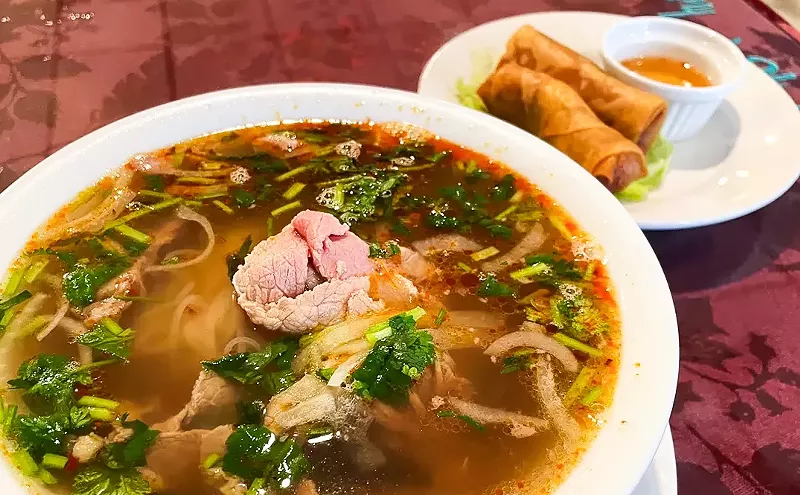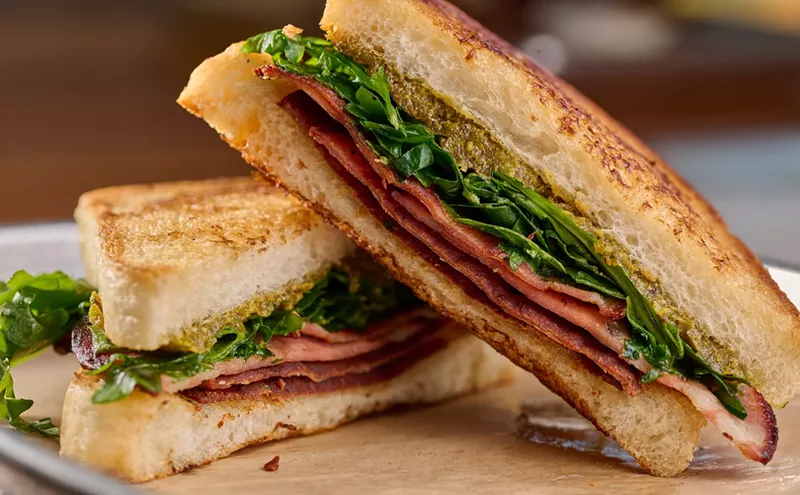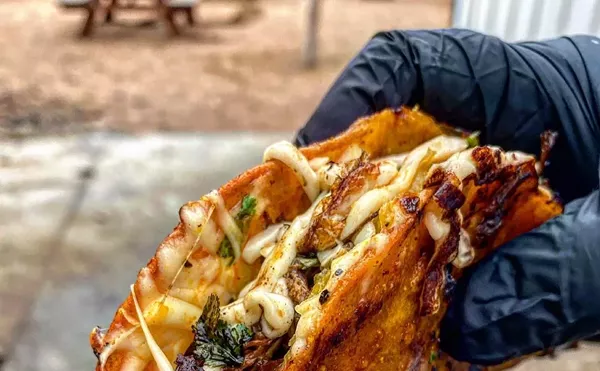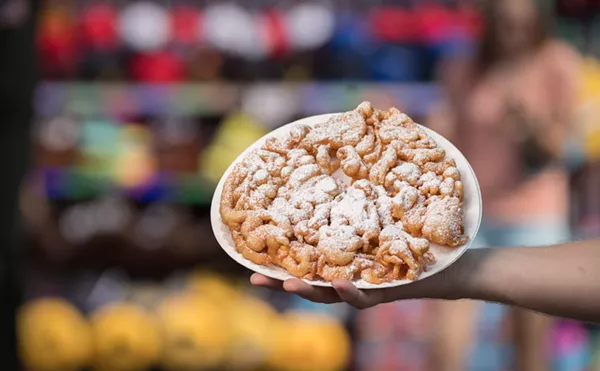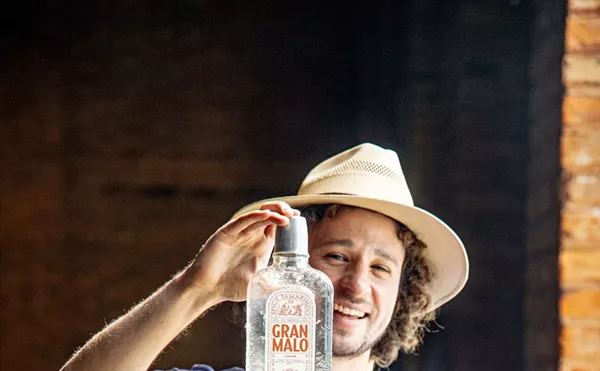Anastacia Quiñones is just one week into her new job as chef at the modern Mexican cuisine spot Komali. The Dallas native attended the Culinary Institute of America in New York, then fell in love with San Francisco after just several hours visiting. After working there for a few years, she returned to Dallas to be back with her family and worked at Victor Tango's, Alma and now Abraham Salum's Komali.
We spoke with her for this week's Three-Course Interview.
What was your childhood like, from a food perspective? My mom was an in-house chef for a family in Highland Park. She didn't actually know how to cook going into the job, she lied about it, and then ended up teaching herself by watching Sesame Street and Julia Child. She would then be so proud of the food she made, things like chicken tetrazzini and spaghetti Bolognese, that she would bring it home for us. So, we ate a lot of different things.
So was your mother part of your inspiration for becoming a chef? Yes, she was. She had a catering business on the side and I didn't really want to cook growing up, but I saw how people reacted to her food and it felt great.
After I graduated from high school she tried to talk me into mortgage or real estate, and I tried that for a little while until I was bout 21, then I decided that I wanted to cook. And she told me that if I was going to do it then I needed to go to school. That's when I went to the CIA.
How did that go? I got a taste of New York, French food and classical French training and, then there was no way I could come back to Dallas. It was seven years before I was ready to come back home.
Did you stage in New York? No, because I really wanted to just focus on school and making good grades. And, I'll be honest; I was a little intimidated by New York. Then, during a vacation I visited San Francisco with my roommate and we were in the city for what felt like days but it was only four hours and I fell in love with it. I knew I had to move there.
What hooked you? The energy. The way the food was set up. How you could walk into any hole-in-the-wall place and find organic produce on the shelf. The local food was amazing and I loved how restaurants would get food at the farmers market in the morning and have it on their menu that night. I hadn't ever seen anything like that and had so much respect for it.
Where did you work in San Francisco? I worked for Charles Nobb Hill. It had actually closed then re-opened under a new concept. There were only three of us and soon after we started my sous chef left to go to Jardiniere and he invited me to go with him and I went.
What was it like working at Jardinière? I staged at Jardinière for one day and it was so scary. I remember walking up to the line to get salt and the chef, Robbie Lewis, walked up to a kid on the line and said, "What is this?" And the kid said, "It's a turnip, Chef?" And the chef said, "Do you hate farms?" And the kid said, "No." And the chef said, "Then why are these burned?" Then hit the kid on the back of his hand with a spoon and walked off.
That was my first experience in a French brigade kitchen and I was terrified. But in way I got a rush out of it. Then 200 covers would hit for the opera all at once and that adrenaline just feeds you and you always want more.
How long did you stay after that one-day staging? Two years.
What did you learn about the San Francisco diner? They're adventurous. There aren't a lot of fast food places in San Francisco, so people are very well educated about what's going on in the food scene and they know what they want. They don't necessarily demand local food, they're just use to it.
What was the relationship like between farmers and chefs? Great. Traci Des Jardins would visit farmers and go to the farmers market twice a week. Her pastry chef would get up early Saturday mornings and go pick the strawberries for the desserts. It was normal to do that. They would never use anything that wasn't in season. When you decided to come back to Dallas, what did you bring from that experience? When I first came back, I ate somewhere and I was shocked at the little things that weren't being done that are really simple and take a dish to the next step.
How has the Dallas dining scene changed since then? It's changed so much over the last few years. When chefs prepare meals they don't really give a damn about what the trends are and their doing their own thing and people respect that. Local products are also making their way into the scene.
Growing up here, where did you eat? My mom loved El Fenix, but I use to rebel and tell her that she could make this stuff better -- so I would always order the chicken-fried steak. But mostly, she cooked at home for us. The biggest treat for us was going to the farmers' market and she would give my brother and me each five bucks and we would race to see who could get to the end of the shed the fastest. He would always try to find the biggest watermelon.
Do you have any favorite restaurants now? I still love Victor Tango's. Their food is just great. He (Chef Bussey) always gets seasonal products and uses them in his dishes. And I also like Cedars Social. I loved Jack's Backyard when it was open too.
Is there anything you think the Dallas food scene needs more of? From what I've seen in the past four years alone there have been such huge changes, I think it's going great. Chefs have really stuck up for themselves and have opened places where they're serving what they want and they're really showcasing their talents.
What would you like to see less of? (Chef Abraham Salum has sat down near us and interjects, "Fast food." Everyone agrees.)
Are there some chefs you're excited about? I really like what Matt McCallister is doing. I love Brian Luscher, he's been around for so long, but keeps things fresh and amazing -- plus, he's such a nice guy. There are so many respectable chefs in Dallas, it's hard to think of them all. Abraham Salum.
You like him? Yeah, he's all right.
(Salum is digging into a plate of enchiladas: Who me?) What did you take away from your experience from Alma? I learned how to run a massive kitchen and how to manage people on a larger scale. Also, time management and interacting with guests -- at first that was really hard for me.
Do you mean walking out to tables and talking to guests is hard for you? Yeah, I'm actually really shy. It's hard for me. But, he does it so well (pointing at Salum).
It makes me nervous. Because you put yourself out there and people are going to tell you what they think, and you have to respect that.
On what occasions do you visit a table? When someone wants me to come out and say hi, or if Abraham wants me to meet a guest. Or if someone is really upset I'll go talk to them about what I need to do to make it better.
So you don't ever go out just to work the room? (Laughing) No! I don't have time. When people come in here Abraham makes every single guest feel like the most important person in the room. And he has more of a following, people come in for that. And I can't compete with that right now.
Salum: She's not competing. She's complementing. We talked about it in our first interview. I want her to be the face of the restaurant as much as I am.
(To Salum) What did you learn about her from that first interview? Salum: I thought she was strong and had a commanding presence in the kitchen and she could easily run a kitchen. She needs a little guidance in a few things, but other than that, she knows what she's doing. And she's sweet. And that's important here because we treat all of our employees well here. There's no tyrant in our kitchen.
(To Salum) So, no yelling in your kitchen? Salum: No, you don't get anywhere with that even though there are still some that treat their people like that. I walked away from our first conversation thinking I really wanted her to work here.
What are some of the important factors in having that command in a kitchen? Never ask anybody to do something that you wouldn't do yourself; and that's primarily an issue of respect. I'm not going to ask someone to clean every hole in the mat if I wouldn't do it. Working in a male-dominated kitchen also requires a lot of humility.
What do you look for in your cooks? Working efficiently is huge. And I really want them to enjoy what they do. They have to enjoy cooking and food or it won't work.
What are some ingredients or items that are underrated? Chilis! If everyone knew what a mulato chili was, or a guajillo chili and cascabel, it would be wonderful!


